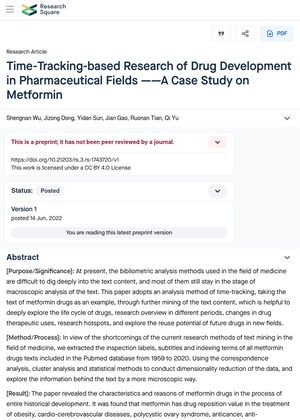Time-Tracking-Based Research of Drug Development in Pharmaceutical Fields: A Case Study on Metformin
June 2022
in “
Research Square (Research Square)
”

TLDR The conclusion is that metformin may be useful for treating various conditions beyond diabetes and that time-tracking analysis is a good way to review drug research.
The document presents a time-tracking analysis of metformin, a drug used in the treatment of diabetes, using text mining methods on texts from the Pubmed database from 1959 to 2020. The study found that metformin has potential for repositioning in the treatment of various conditions such as obesity, cardio-cerebrovascular diseases, polycystic ovary syndrome, cancer, inflammation, gut microbiome alterations, and aging. The study also predicts potential future uses for metformin in treating Alzheimer’s disease, neurodegenerative diseases, and androdegenerative alopecia. The research also indicates that the study of the AMPK hypoglycemic mechanism, a key part of metformin's function, will become a focus for other hypoglycemic drug research and development. The study concludes that time-tracking analysis is an effective method for reviewing drug research.



